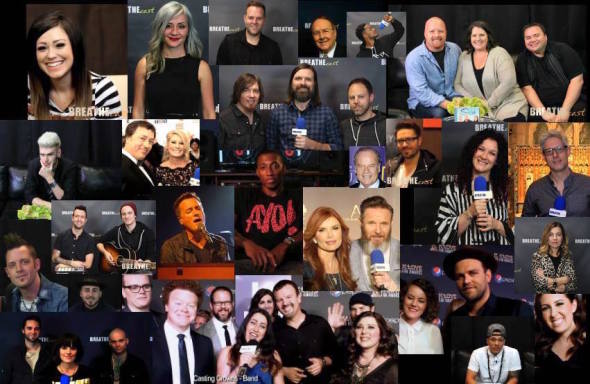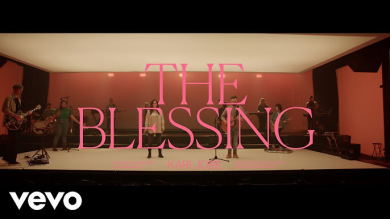Good Talks|June 05, 2015 09:08 EDT
Contemporary Christian Music Dying? The Case for CCM Beyond Record Sales and Dwindling Christianity [RESPONSE]

Contemporary Christian Music, a.k.a. CCM, has been the backbone of believers looking to find music that feeds their soul and heart in order to be closer to God. But could it be, that this very driving force of Christians is dying out because of a nearly a 40 million in sales drop off? Well at least one article circulating on the Internet thinks so, and it has the Christian music industry in a bit of a stir on whether this claim is legitimate.
In "Who killed the contemporary Christian music industry," author Tyler Huckabee cites two reasons that CCM is dead, one being dropping record sales and two, being "America's waning interest in Christianity as a whole." The author goes on to say, "The precipitous dropoff in CCM sales has left Christian labels and artists staring into the void alongside their pastors, scratching their heads, wondering where they went wrong."
So lets address these claims head on, and see if there is some weight to this. After speaking with a few different professionals in the industry, there does not appear to be a right answer.
The article says stats indicate CCM sales are down from 50 million during its peak, to 14 million in 2014. Although the source and time frame is not specified, these numbers should not shock anyone. This is not specifically a CCM issue. Music all across the board is failing to sell records. According to the Guardian, physical album sales are dropping roughly by four million a year and not a single album went platinum in 2014 except Taylor Swift.
During the '90s, top artists were going platinum left and right. Britney Spears, NSYNC*, Jay Z, and Eminem could seemingly go platinum in one day. By the year 2000 the next wave of music distribution turned the industry on its head - digital music on the Internet through Napster, Limewire, and on and on. Music became accessible digitally and for free. Even further expounding this problem for labels is something such as iTunes, where instead of buying a full album, now people can just download their favorite song and skip the rest. Now one step above that is Spotify and Pandora where users can stream music for free, and the artists get a minuscule amount of money for it. This is something the industry genre wide has not fully recovered from.
While the above-mentioned artists can still sell a million records, the difference is between million and millions, and at what rate they previously sold those millions. The top artist in sales right now is Swift, and she is bucking the system by not allowing her music to be streamed, which increases the chances of her music being purchased because it can't be listened to anywhere else.

Taylor Swift will be featured in the upcoming film The Giver. the film will premiere on August 15, 2014.
So what happens if you are not one of those artists? Well many, including a lot in Christian music, are taking to crowd funding to support themselves. Kickstarter, IndieGogo, GoFundMe, have become God send's for the not so monetarily blessed artist to create an album. This also allows for the artist to be independent because they do not have to rely on a label's money. Without a label's input, no doubt the artist will probably sell fewer records because they do not have the commercial funding. Whereas a record label may help you sell 100,000 records, an indie artist might pull off 50,000 on their own. The difference is those 50,000 willingly invested into this artist who are die hard loyal returning costumers who support them, thus giving the musician all the stats and marketing they need.
The business model to sell records has changed. With the popularity of social media, musicians are more focused on engagement with fans than selling records because that one to one connection means more than ever. This change in the music business still need to get the kinks worked out, both between the labels and the artists themselves. It is true the sales are down, but why? It has more to do with the Internet than and perhaps the music itself than actual record sales and a decline in Christianity.
"I don't agree with the statement that the CCM-based record labels have gone wrong - the industry as a whole is learning how to work with the changes in music sales, just like mainstream labels are experiencing," said MergePR's Stacie Vining to BREATHEcast. "This can't be a one-sided story claiming that the CCM industry is dead. When digital sales started to take over and labels and artists were learning to adapt and grow with the changes, it became news how the music industry as a whole is suffering and sales just aren't like they used to be. This isn't just for the CCM market."

Vining would know best about the sales of CCM because she works with some of the top artists such as Family Force 5, Kari Jobe, Jeremy Camp, Matthew West, and Hillsong UNITED. The publicists are the ones getting these artist's names out there, and the ones listed here are among the most successful.
CCM in the '90s was much bigger because it was still following the old model without the competition of the new model. DC Talk, Newsboys, Audio Adrenaline, Michael W. Smith, Carman, Amy Grant, and the list goes on, were the innovators of the music. Christian music began shifting in the '80s away from church music, hymns, and gospel. The '90s were a time when most Christians finally turned away from "rock and roll is the devil" and began to embrace different types of music. They became the clean Christian answer of the mainstream music world.
In terms of music, these pioneers were genius, and in terms of business, they were equally as savvy. Their business was to reach souls for Christ, and they knew the conventional church music was just preaching to the choir. This crossover mainstream appeal came from thinking outside the box.
This "preaching to the choir" effect is felt by some of the artists in Christian music, but in no way do they dismiss the importance of it.
"I think that CCM does it's job within the church walls if that makes sense. I personally wouldn't turn on the radio and hear a CCM song and if I had never heard of Jesus, and be like 'Oh my gosh' but that's just me," said hardcore band Haste the Day's Stephen Keech in a previous interview. He does think people are "getting what they need from Christian music but I don't think the rest of the world is. It's not what everyone is called too."
The other argument to add to that is about the creativity or the "lack of interest" in the music.
Further expounding on that point is former Audio Adrenaline guitarist Barry Blair, who said "I know when we (A.A.) were doing it, we and a lot of the bands I knew, we loved music, we loved God, we loved people, we were trying to share our faith but also trying to make great music from an artistic standpoint, all of that wrapped into one. If it loses track of that it becomes too much about commercialism. It becomes too much about pure evangelism or sharing your faith at the expense of trying to be creative or make good art."
He continued, "It does work. Trying to keep that balance is important, maybe for some people. I think this is true for me. I grew up in the Christian music before us, the 80s Christian music. For me the straightforward Christian lyrics affected my life in a positive way. Outside of worship music, there is not as much music that is really doing that. For some people that's what they want, for other people that's why they've lost interest in it, it doesn't speak about their faith as directly as it used to".
However, is that not what CCM is for? It is in the name, Contemporary Christian Music. It is music for Christians and if it appeals or reaches somewhere else, then great. The music can still uplift and encourage even on a non-spiritual level.
Yes, some of that appeal in earlier CCM is missing from today. Yes, perhaps some of the music sounds the same, but the disadvantage these newer artists, or even the older ones still around, have is the current trends in popular music. Tuning into the radio of your favorite station for even just 20 minutes will be enough to test this theory of music all sounding the same.
Blair thinks that all across the board nothing is as special as it used to be because "we are so inundated with media."
"I see that same thing happening in mainstream music. Everyone has to do the same thing so they can get on the radio...it forces it all to have a sameness about it. Instead of the industry promoting originality, we are in this cycle where the industry promotes sameness. It is another good reason to be in favor of independent music, band's who want to do their own thing their own way."
Christian music writer/producer Aaron Rice (Tobymac, Mandisa) also spoke to this idea adding, "A lot of time great art takes money. It's cheaper for one person to program a whole song with their computer than to make records 'the old way' with live musicians, when in many cases, that would serve the song and artist better."
People complain of this lack of diversity or "great art" in music but they keep buying it anyway. Events such as the K-LOVE Fan Awards prove the point that people still care, as well as Tobymac and for King & Country selling out almost every show they do. The fact that Hillsong UNITED's Empires debuted in the five spot of the Billboard 200 is a testament to that. The point is music is still as popular as it ever was despite what record sales may show because the results are still out there in different mediums.

It is also important to think about what is considered CCM. In the article Lecrae gets grouped into this category, and while there is a valid argument for that, does he really belong there? However, going by this example of what constitutes CCM, it would be safe to lump in bands such as Skillet, Switchfoot, and Flyleaf into the conversation. They have sold millions and millions of records combined and are pretty much just as popular in the mainstream as they are with Christians. Going further, we can look to heavier bands such as Underoath, P.O.D., and RED that have fan bases in the hundreds of thousands. These bands don't cater to a CCM audience but they sing about Jesus. So really, what is considered Contemporary Christian Music?
"CCM is the only genre of music that is literally defined by its lyrical content," said Rice. "If you were to put CCM 'station' on any of your streaming platforms you could put, TobyMac, Tomlin, Mandisa, Mercy Me, Lecrae, Pillar, Red, and Nichole Nordeman in succession. That doesn't happen in the general market, in the general market its more based on musical style and sound. I also think the listeners are longing for more creativity. It's why house shows, indie artists and singer songwriters are starting to see such a revival."
That last part about indie artists, house shows, and singer songwriters is especially true as that sound is as popular as ever. Musicians such as Ellie Holcomb, Matthew West and to an extent, those mentioned in the original article - Kevin Max, Derek Webb, and John Mark McMillan have always experimented with sounds whether layered or highly produced works. These "indie" types still fall under the vision of CCM.
The final point to address would be the waning popularity of Christianity. This appears to be a subjective notion. While this may be true to some extent, especially with the portrayal of Christians in the media, this certainly cannot be a main factor. The example provided within the article is enough proof of that - worship music. Many Christians view Worship music as the purist line of communication to God where a believer will invite God's presence into their hearts. If this is now the most popular form of Christian music, that is saying that Christians are stronger than ever because they are going directly to the source.
Perhaps the trend of artists moving away from their CCM roots is more of a reflection on America's body of Christians as a whole longing to be closer to God. If the worship setting is more popular than listening to regular music, what does that say? With groups such as Hillsong UNITED, Kings Kaleidoscope, Pacific Gold, Gungor, and Crowder changing the way conventional worship is listened to, it kind of all falls into that contemporary category. The music is no longer A, B, C, lets sing along at church. It is experimental, at times artsy, and more free of the constraints of a label. So at this stage, maybe going the worship route makes even more sense for a CCM artist looking to branch out since the audience is basically the same people.
"Worship has become king, and when worship music began to creep onto radio it really began to put the clamps on the industry. Radio has done the hard part in teaching the songs, so worship teams have to simply get up and play," said Rice. "Labels, and publishers love this because not only are they getting performance royalties, and the marketing of radio to help sell the records, they're also getting Christian Copyright Licensing International income from the churches who play the songs. Again this is not a bad thing, this is not good business, it's great business."

He does feel however that worship music may be "hurting the creativity" of people who do not fit in the worship mold. "Everything starts to sound the same, when everything starts to sound the same people start tuning it out."
He admits that it hurts the bottom line for the artist who cannot crossover. "I do understand that music sales in general are down. I also understand that music buyers are a subset of the world's population and CCM buyers are a subset of that subset."
He continued, "With the decline in overall sales (and CCM specifically), and being an industry that relies largely on a person or family's disposable income, it's become increasingly difficult to maintain a decent profit margin."
While that may be true, the lines are blurred between what the difference between CCM and worship is because some of these worship artists are cracking the charts and appearing on TV singing "Jesus music."
Also, as shown with the few examples, there still appears to be enough evidence that CCM artists could be moderately successful. It will never be like the '90s, and actual sales may continue to gradually dwindle. But the hope is as, Vining stated, that they are "learning to adapt and grow with the changes" so the dream may be just around the corner. Instead of asking what's killing it, the question should how can we resurrect it. Instead of saying it's dead, say it's hibernating and waiting to be woken up. The audience is still there, and the artists are still producing.
The business side of music needs to make money, and the ministry side needs to proclaim the gospel. Christian music is about the sovereignty of a great God, so surely He will provide for where and how the music moves.
Perhaps it is God's greatest gift to man. Music regardless of what it sounds like or who does it will always have this innate ability to move us, and send us to a place that only we can feel. The experience is different from person to person.
"I think music...can move something or speak for something that we don't have words for yet. It kind sneaks in the back door of our brain and can get into places of our mind and our soul that we shut out because a lot of things can't," Ellie Holcomb told BREATHEcast in a prior interview. "Thinking to things like pain, suffering, loss and ache and tension, in away that maybe a sermon may not be able to because it comes in this really beautiful package."

The beauty of music of is just that - the emotion, the feeling, the life, and whether that comes through CCM, punk rock, or jazz, the market will always be there. The record sales are down, but Christians need the music more than ever. There is nothing "dead" about it, especially since it is filled with so much life in a sometimes-hopeless world.
Thanks to all the artists and professionals who contributed their thoughts and helped shape this article. Follow Justin on Twitter @JSarachik_BCast












